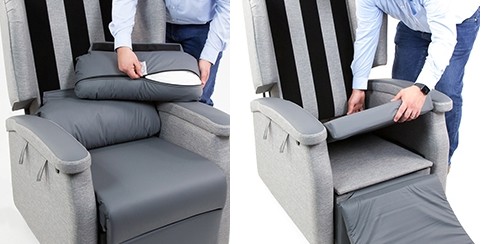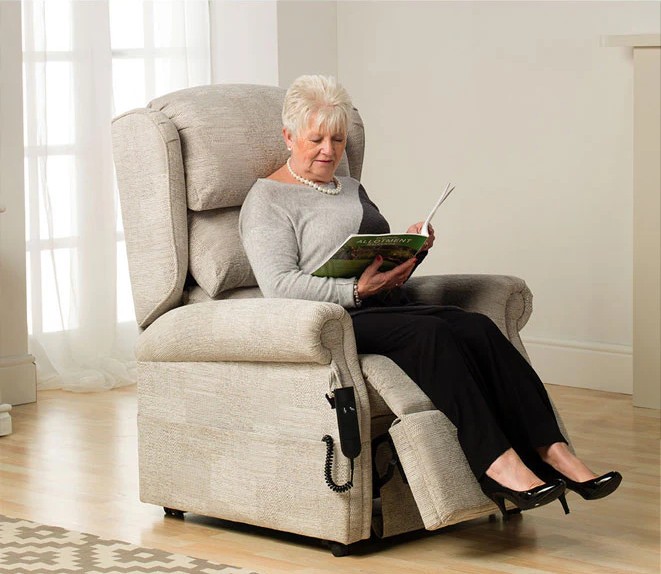Finding the right Riser Recliner Chair
At Home Care Hire, we know that choosing the right riser recliner is more than a comfort decision — it’s about safety, recovery, and long-term wellbeing. Whether you’re caring for a loved one at home or recovering from surgery yourself, understanding the difference between medical and domestic chairs can help you make an informed choice.
Before selecting the preferred chair for our rental business, we visited manufacturers, explored showrooms, and tested models at medical exhibitions. We then purchased two shortlisted chairs and used them extensively before the Repose Lynton emerged as our clear favourite for customer comfort and clinical suitability.
We learned a great deal from this process. In this article, we’ll briefly explore the key differences between medical and domestic riser recliners — and why a medical-grade chair offers distinct advantages for recovery and care.
What Are the Differences Between a Medical Riser Recliner and a Domestic One?
Medical riser recliners are designed for both clinical and domestic settings, whereas domestic chairs are typically built for comfort in the home — not for healthcare environments.
Price: A domestic riser recliner may retail around £500, while a medical-grade chair with advanced features typically starts at £1,000+.
Suitability: Medical chairs meet hygiene, safety, and support standards required in care settings. Domestic chairs often lack these features.
Why Choose a Medical Chair?
Here are some of the key benefits:
- Pressure Management
Medical chairs often include pressure-relieving cushions and fabrics that reduce the risk of pressure sores. These features are critical for individuals spending extended periods seated or recovering from surgery.
- Posture Support
Proper posture support helps maintain spinal alignment, reduces muscle fatigue, and prevents slumping — which can impair breathing and digestion. Medical chairs are designed with adjustable lumbar and head support to accommodate a wide range of body types and clinical needs.
- Hygiene
Medical chairs use wipe-clean, antimicrobial fabrics that resist staining and odours. This makes them ideal for shared use, rental settings, or environments where infection control is a priority — such as post-operative recovery or palliative care.
These features make it a reliable choice for both users and caregivers, helping to create smoother, safer transfers from beds, chairs, or toilets.
Features of a Medical Riser Recliner Chair
A medical Riser Recliner Chair will typically have some, or all, of the following features.
Adjustable Back Cushions
The waterfall cushion design allows cushions to be repositioned or removed, offering a personalised seating experience. Unlike stitched-down domestic upholstery, this flexibility improves posture and reduces pressure build-up.
In our own trials, the waterfall design proved significantly more comfortable. It also helped regulate body temperature — a key factor in skin integrity and pressure management.

Removable Seat Cushion
Medical chairs allow for cushion upgrades as care needs evolve. A memory foam seat can be swapped for gel or air cushions when pressure risk increases — a feature not available in stitched domestic models.
Tilt-in-Space Movement
This advanced mechanism tilts the entire chair while maintaining the angle between the seat and backrest. It promotes natural posture and redistributes pressure evenly. Having tested chairs with and without this feature, we can confidently say it makes a noticeable difference in comfort and support.
Four-Way Stretch Fabric
This specialised fabric stretches in all directions, reducing friction and shear — two major contributors to pressure sores. It’s also used in our memory foam mattresses for the same reason. Domestic chairs typically use standard upholstery that lacks this flexibility.
We understand how important peace of mind is when it comes to mobility and care.
Conclusion
Choosing a medical riser recliner isn’t just about comfort — it’s about safety, hygiene, and long-term wellbeing. Whether you’re recovering from surgery, managing mobility challenges, or supporting a loved one at home, a medical-grade chair offers peace of mind and clinical-grade support.
If you’re considering a riser recliner for recovery or care, explore our clinically tested options and learn more about the Repose Lynton chair here. We offer flexible rental plans and expert guidance to help you choose the right solution.
The Oxford Up Stand Aid makes standing transfers safer and easier for both the person being supported and the person providing care. If you or a loved one could benefit from this kind of support, our team is here to help.
Have questions? Contact our team for friendly, expert advice.
